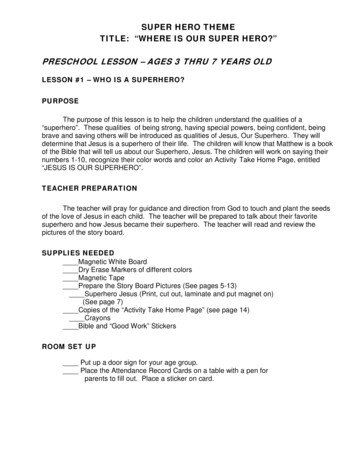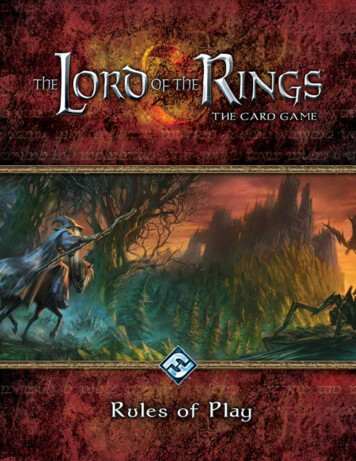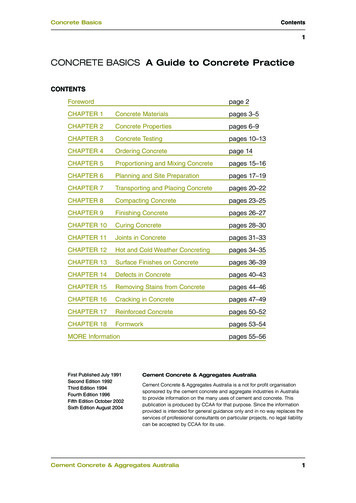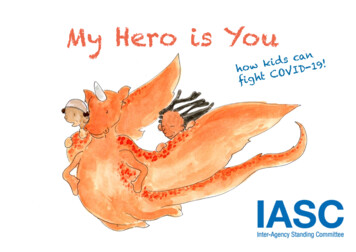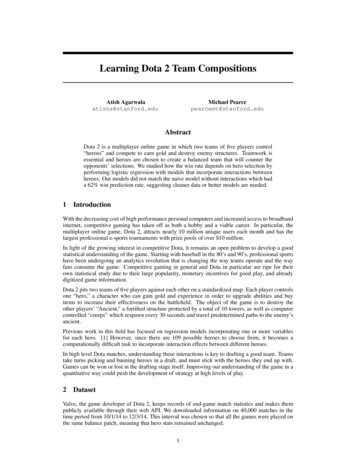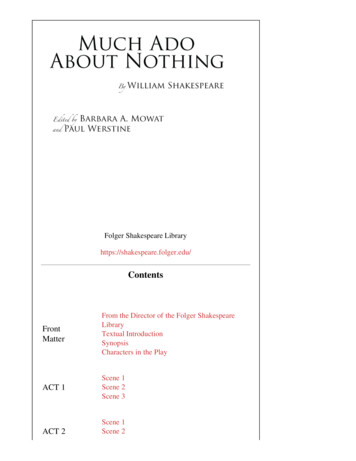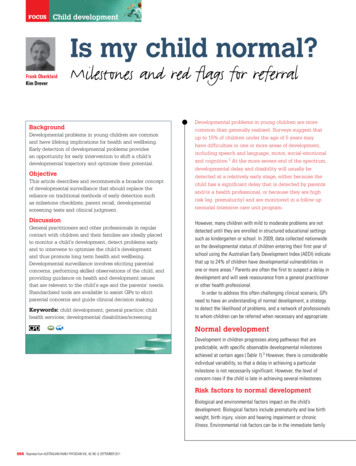
Transcription
Why hasMalala beennominated?Child Rights Hero Nominee Pages 27–47Malala YousafzaiMalala Yousafzai hasbeen nominated for the2014 World’s Children’sPrize for her courageousand dangerous fight forgirls’ right to education.One month after Malala was shot, children hold up pictures of her at aceremony in the city of Karachi in Pakistan.It is 9 October 2012.“Which one of you is Malala?” asks theman dressed in white. He hides his face with abandana.None of the girls on their way home fromschool in the back of the minibus say a word.But their faces reveal who Malala is.The man raises his pistol and fires threerapid shots. The first bullet hitsMalala in the head.Malala has fought long andhard against the Taliban in theSwat Valley in Pakistan, forgirls’ right to go to school.Now, at the age of 15, she isclose to death.But when Malala regainsconsciousness, she has become a symbol for girls’ rightto education throughoutthe world.PHOTO: MASROOR/CORBIS/TTWhen Malala is born,her arrival is notcelebrated as muchas it would have been if shehad been a boy. ManyPashtun people, as peoplefrom the Swat Valley areknown, believe boys are moreimportant than girls. ButMalala’s father Ziauddin isdifferent. Right from thestart, Malala is the apple ofhis eye.In her book about her life,Malala says that she was bornin the most beautiful place inthe world:“The Swat Valley is a heavenly place full of mountains,flowing waterfalls and clearlakes. The sign at theentrance to the valley reads‘Welcome to Paradise’.”In this ‘paradise’, Malala isset to experience earthquakes,and severe flooding that killsmany people. But the worstPHOTO:E LYSEMARKSMalala started to speak outfor girls’ rights at the age of11, when the Talibanbanned girls from going toschool in the Swat Valley inPakistan. Malala defied therules and kept going toschool. Her life was underthreat and at times she hadto go into hiding. Finally, atthe age of 15 Malala wasshot and almost killed bythe Taliban on her wayhome from school. ButMalala survived. The Talibanthought they could silenceMalala by killing her. Insteadthey gave her an evenstronger voice, which cannow be heard all over theworld. Malala is determinedto continue her struggle forevery child’s right to an education. She believes thateducation is the future, andthat one child, one teacher,one book and one pen canchange the world. She hasher own fund, the MalalaFund, which was createdto help girls get toschool.Malala.27
On the way home from schoolMalala travelled by minibus withseveral school friends, which theTaliban discovered.PHOTO: ANJA NIEDRINGHAUS/APGirls hit hardMalala spends a lot of time ather father’s school in the biggest city in Swat, Mingora.She learns early on how different boys’ and girls’ livesare, and how men are incharge. But Malala also learnsfrom her father that thingsdon’t have to be like that. Hefights for everyone’s right togo to school – even poor people and girls.When her family go to visitrelatives in a mountain village, Malala notices that hercousin Shahida is missing.She is only ten years old, buther father has sold her to anolder man who already has awife.Malala complains to herfather about how girls arebeing hit hard in Swat. Hereplies that things are evenPHOTO: ANJA NIEDRINGHAUS/APthing of all is when theTaliban come to the SwatValley. They threaten and killpeople, forcing women tocover their faces and girls toquit school. They will bombover 400 girls’ schools inSwat.In the year before she was shot,Malala always travelled toschool by rickshaw. Before thatshe used to walk, but after thefamily started receiving threatsher mother was worried.worse in the neighbouringcountry of Afghanistan, just150 km away. The Talibanthere are forcing women towear burkas to hide their faces, burning girls’ schools andabusing women who wearnail polish. Many of theTaliban are Pashtun people.Arrival of the TalibanMalala is ten years old whenthe Taliban come to the SwatValley. They gather people’sCDs, DVDs and televisionsand burn them in huge pileson the street. The Talibanalso stop young children frombeing vaccinated againstpolio. They shut down cableTV channels and ban a boardgame that children love toplay.Then the Taliban set theirsights on girls’ schools. WhenMalala’s family return from avisit to relatives in a ruralarea, there is a letter pinnedto the school gate. It is awarning to Malala’s fathernot to allow the girls to continue wearing normal schooluniform. Instead, they mustwear burkas and cover theirfaces. After that, the girlsalways cover their heads whenentering or leaving school.Malala went to Khushal Girls’ High School, which was founded by her father.You can’t tell from the street that it is a school.From the family’sphoto albumMalala with her little brotherKhushal and their grandfather,who they call Baba.PHOTO: ANJA NIEDRINGHAUS/APMalala has started to read, and herlittle brother Khushal copies her.28
Every morning at Malala’sschool, Khushal Girls’ HighSchool, the girls gather underthe flag of Pakistan. This picturewas taken one month afterMalala was shot. Her schoolfriends were very worried abouther, and about their own safety.PHOTO: ANJA NIEDRINGHAUS/APNo girls in schoolIt is now 2008 and theTaliban begin blowing upschools – mostly girls’ schools– almost every day. Malala iseleven and is interviewed onseveral TV channels. Shespeaks out for girls’ right togo to school. In a BBC interview in Urdu, the nationallanguage of Pakistan, shesays:“How dare the Taliban takeaway my right to education?”Things go from bad toworse. The Taliban announcethat all schools for girls are tobe closed. From 15 January2009 no girl in the SwatValley will be permitted toattend school.At first Malala thinks itcan’t be possible. How couldthe Taliban stop her and herfriends from going to school?But her friends ask who couldstop the Taliban from doingit – after all, they have alreadygot away with blowing uphundreds of schools.Malala starts to write a diary about life in Swat underthe Taliban. When it is readout on BBC radio it is under amade up name, Gul Makai,which means cornflower. Herschool friends talk about thediary at school, but they don’tknow it is Malala who is writing it. She talks about how itfeels to be afraid, about theban on girls going to school,and about being forced towear a burka and hide herface.When she is filmed for adocumentary, Malala says,“They cannot stop me. ourchallenge to the world aroundus is: Save our school, saveour Pakistan, save our Swat.”But soon the Taliban closedown their school.Widespread protests causethe Taliban to change theirminds and allow girls up tothe age of ten to attendschool. Malala and herfriends, who are too old to beallowed, go to school in theirnormal clothes, hiding theirschool books under theirshawls. The girls’ headteachercalls it ‘the secret school’.Then one day the army ofPakistan orders the inhabitants of the Swat Valley toleave their homes. The armyare planning an offensiveagainst the Taliban. Over amillion people become refugees in their own country.Malala’s family leave the valley and are only able to returnhome three months later. Thearmy say that the Talibanhave been defeated, but soonthe Taliban start to blow upschools again.Serious threatsIn January 2012 Malala travels to the big city of Karachiwith her family. The provincial authorities have decidedThe girls in the picture are on their way home from schoolin Malala’s hometown of Mingora. They are wearing burkas. The Taliban demand that they observe Purdah, whichmeans that women and girls are not allowed to showtheir faces to men. The Taliban want to stop girls fromgoing to school and they have bombed over 400 girls’schools in the Swat area, where Malala comes from.With 185 million inhabitants, Pakistan has the world’sseventh-largest population. Three out of four women inPakistan can’t read. In rural areas, there are places whereonly three in a hundred women can read. 5 million girlswho should attend school get no education whatsoever,and Pakistan is one of the few countries in the worldwhere illiteracy is rising. Many families give their sons aneducation, but not their daughters, since they leave thefamily when they are married off. Less than 2 percent ofPakistan’s budget goes towards education, while over 25percent is spent on defence.PHOTO: VERONIQUE DE VIGUERIE/GETTY IMAGESSchool for girls under threat29
Malala’s school is not visiblefrom the street. The girls quicklyenter through the iron gates,and they usually check thestreet before leaving.always afraid of the Talibanwhen she walks up the steps.Once the rest of her familyhave fallen asleep, she goesround checking that all thedoors and windows are properly closed and locked. Sheprays to Allah for protectionfor her family.PHOTO: ANJA NIEDRINGHAUS/APto name a school afterMalala. She holds a speech forall the politicians, saying:“We must work togetherfor girls’ rights.”In her book, Malala talksabout sitting on the beach inKarachi and thinking aboutwhat life is like for girls andwomen in her country:“We want to be able tomake our own decisions andbe free to go to school orwork. Nowhere in the Korandoes it say that a womanshould be dependent on aman or have to listen to aman,” she thinks to herself.While they are still inKarachi, Malala’s father seeson the internet that theTaliban have issued threatsagainst two women, and oneof them is Malala. “Thesetwo women should be killed,”he reads.Malala’s parents tell herabout the threat and herfather says that she shouldstop speaking out about girls’education and against theTaliban, just for a while.“How could we possibly doT O : S HE R I N Z A D A/A P30School bus stoppedMalala and her father areplanning to travel to the villages in the Swat mountainsduring the next school holidays, to talk to parents andchildren about how important it is to learn to read andwrite.“We’ll be like educationmissionaries,” says Malala toher father.Malala’s mother will notallow her to walk to schoolany more. Instead, she alwaystravels by rickshaw. She travels home with twenty schoolfriends, on the back of a truckwith a canvas roof. In theback of the truck there arethree long benches.The school bus stops at thesteps leading up to Malala’sstreet. These days she isPHOMalala is unconscious afterbeing shot with three bullets.One of them hit her head.PHOTO: APAfter being flown by helicopterfrom her hometown of Mingoraon the day she was shot, Malalawas taken to a military hospitalin the city of Peshawar.that? I have been invited tospeak at lots of events, and Ican’t just pull out,” saysMalala.When the family return toSwat, the police show themthe document about Malala.It says that because she hasbecome well-known both inPakistan and around theworld for opposing theTaliban, a death threat hasbeen issued against her.The provincial governmentwant Malala to become anambassador for peace, but herfamily say it is too dangerous.Malala starts locking the gateto their family home everyevening. Her father explainsthat the Taliban have startedcoming after anyone whospeaks out against what theTaliban stand for.Which one of you is Malala?It’s exam time. On the nightof 8 October, Malala sits uplate studying for an exam inPakistani history. Her wholefamily eat breakfast together.Today, Malala’s mother isgoing to start learning to readand write.The school bus does tworuns after school every day.Malala and her friends arechatting after the exam, sothey take the second run, attwelve noon.Suddenly two men dressedin white step out onto theroad, forcing the minibus tomake an emergency stop. Oneof them, wearing a hat and abandana covering his eyes,climbs onto the back of thebus and bends to look in
On 14 October 2012, five daysafter Malala was shot, childrendemonstrated against theTaliban’s attack on her on thestreets of the city of Karachi.PHOTO: FAREED KHAN/APof the UN: “Today is the dayof every woman, boy and girlwho has raised their voice fortheir rights. Let us wage aglobal struggle against illiteracy, poverty and terrorism.Let us pick up our books andpens, they are our most powerful weapons. Education isthe only solution. Educationfirst.”On 12 July 2013, the daythat Malala turns 16, she isinvited to the UN. 100 youngpeople from 80 countrieshave come to listen to Malalaand the UN SecretaryGeneral, Ban Ki-moon, callsthe day ‘Malala Day’. In hisspeech to Malala he says:“I urge you to keep speaking out. Keep raising thepressure. Keep making a difference. And together let usfollow the lead of this bravegirl. Let us put educationfirst. Let us make this worldbetter for all.”Malala replies to the headMalala’s voice strengthenedThe Taliban thought theycould silence Malala by killing her. Instead, they gave heran even stronger voice, whichcan now be heard all over theworld. Malala is determinedto continue fighting for girls’rights.A fund called the MalalaFund has been set up in orderto promote girls’ right to education all over the world.“I don’t want to be famousfor being the girl who wasshot by the Taliban. I want tobe the girl who fights for education,” says Malala. On 12 July 2013Malala’s 16th birthday was celebratedat the UN, in thepresence of onehundred youngpeople from eightycountries. The UNSecretary Generalcalled it ‘MalalaDay’ and gaveMalala a leather-bound copy ofthe Charter of theUnited Nations.This is usually onlygiven to heads ofstate.31 TEXT: MAGNUS BERGMARMalala with her father Ziauddin and her youngerbrothers Khushal and Atal at the Queen ElizabethHospital in Birmingham, UK.PHOTO: SKINDER DEBEBE/UNAwards and UNMalala is flown first by helicopter to a military hospital,and then on to a hospital inthe UK. That’s where she iswhen she regains consciousness a week later. One half ofher face has been paralysed.But after an eight-hour operation the doctors manage torestore her facial nerves.Malala receives severalawards and even becomes theyoungest ever nominee forthe Nobel Peace Prize. Innewspapers she is included inlists of the most influentialpeople in the world.PHOTO: QUEEN ELIZABETH HOSPITAL/GETTY IMAGESunder the roof, near whereMalala and her best friend aresitting.“Which one of you isMalala?” he asks.Some of the girls shout forhelp, but the man forces themto be quiet. Malala is the onlygirl who doesn’t have her facecovered. Nobody says whichone she is, but several of themglance at her. When the manraises his black pistol, Malalasqueezes her best friend’shand. The man fires threerapid shots. The first hitsMalala in the head.
Malala is not alone. The girls onthese pages all come from areaswhere there are Taliban. Just likeMalala, they fight for girls’ right to goto school. It can be dangerous forthem to do that. That’s why theirfaces are covered. There are frequentbombings, and if that happens theyhave to stay off school.More braveBombs stopschool“Education is so important. It changesour lives. Everyone has a right to go toschool. When I dream about thefuture, I dream that I am a teacher, justlike my teacher. I live in an area wherethere is unrest. I feel afraid whenthere are lots of bombs exploding. On those days I can’t go toschool. Once things calm downand I can go back I am happy. Idon’t want to be away fromschool.“Malala is so good. She fightsagainst the Taliban in our area.She is a role model for us.Everyone knows what shethinks and who she is fightingagainst.”Mariam, 12Education gives morepeople jobs“It’s good to have an education. Then youcan choose between different jobs. I likenatural history and I want to be adoctor. Everyone has a right to goto school.“Malala comes from Swat. Shewants to get an education andshe believes that all girls have aright to it. She got shot for that.She is important, and clever.Things can be hard in our areasometimes, just like in Swat.We want an education too, eventhough it’s dangerous here.Sometimes I have to stay homefrom school although Idon’t want to.”Sheila, 1132Education is everything“Education is everything. It affects your whole life, and withouteducation we can’t do much. The right education can mean a lot. Inmy country, all jobs that boys can train for can be done by girls too.If I want to I could become a police officer, soldier, pilot or anythingelse. Boys and girls can have the same jobs.“Politics is important too. Without politics, we cannot developour country. Everyone has a right to get involved in politics. I wantto do that too, and when I gain power I will work to make sureeveryone in our country gets an education. A good education.Right now most schools don’t have a very good system. Many people just learn to recite by rote, and poor parents think it’s better fortheir children to get a job and an income.“Sometimes we have problems with bombs and there is unrest inour area. At those times I have to stay home from school and thatmakes me sad. I know that I’m missing out on something important.“I am grateful that Malala has expressed all girls’ right to go toschool so clearly. Lots of parents in our area make their girls stay athome because they want full control over them. My friends and Italk to children that we meet and encourage them to start school.We talk to their parents too. Sometimes they listen to us and allowtheir children to go to school.I am happy that Malala is able to continue studying. When Ifound out that she writes a diary I got myself a diary too and now Iwrite in it every day.”Asma, 14
TEXT & phOTOs: BRIT T-MARIE KL ANGgirlsEducation developsour country“Everyone has a right to get an education, just asI have. Our country can only develop wheneveryone gets education. Not everyone knowsthat, so we have to tell people and remindthem. I talk to our neighbours and other people in our area, and several of them have lettheir children start school. It’s so important tome that everyone gets an education, and I tryto encourage anyone who has started to continue, and to work hard on their education.The awful thing is that so many girlsaren’t even allowed to leave theirhomes, let alone go to school. Thatmakes me so sad. Education foreveryone is our goal, so eventhough we are sometimes scaredand we know a lot of people areangry with us, we have decidedto fight for education and wewon’t give up! Malala is one of us,and a role model for us.”Rainaz, 14Fighting for others“Those of us who are able to go to school know that we haveresponsibility for others too. In the area where I live there are lotsof girls who come from poor families, and nobody has bothered tosend them to school. Sometimes it is enough for me just to talk tothe girls, and other times I have to go to the parents and discuss itwith them. Because of this, many of them now go to school.“We have many problems in our area – the Taliban, bombs, andhorrible boys who shout stupid things at girls who are walking toschool. I have decided that I want an education, so I have to go toschool even when the road to school is hard. Education is light –and light spreads. We want that light to shine on the whole areawhere I live, and all over our country.“Malala is so brave. I agree with her completely, and I wanteveryone to get an education. All girls have a right to an education.I am glad that I go to a school where we learn how to fight for others. We can’t talk about Malala everywhere, because a lot of people are against her and against education for girls, but there aremany of us fighting just as she does.”Sofia, 15Parents have responsibility“For our country to develop, we need education. Parents haveresponsibility to make sure all children go to school. Where I live,everyone is afraid of the Taliban and of being hurt by bombs.The most recent attack was just a fewdays ago. Many people don’t dare go outwhen there is unrest. I prefer to try togo out, although I am afraid. My family are scared too and they wait forme to come home.“Malala is so brave. I admire her.She wrote a diary about theTaliban that made them angry,and they shot her.”Manoor, 1433
Girls who dream of a difParents say noThousands of“We work together in our family. Just after sunrise we walk tothe brick kiln. Afsana mixes clayand water to get the right consistency and brings the mixtureto the rest of us in a wheelbarrow. I make the bricks and laythem in long, long rows. Thebricks are then counted and weget paid depending on howmany thousand bricks we havemade. If I don’t get an education I’ll end up working at thebrick kiln my whole life. Thatwould be terrible.“I want to go to school too.Our father says no. I asked ourmother too, but she says no aswell. Our parents don’t careabout education. But I know wedo have to work. Unless everyone in our family works wedon’t have enough money. Ifsomeone in our family falls illour income decreases and weneed to buy food one day at atime.”Samina, 13, and Afsana, 12For thousands of years bricks have been made byhand. These days, in many parts of the world, bricksare made by machines. But in Pakistan many families still face slave-like conditions making bricks byhand. Families remain in debt to the brick kiln owners and forced labour is passed from parent to child.Slavery is against the law in Pakistan. Still, manydebt slave children who should really be at schoolspend their days in the clay pit.SaminaAfsanaWant to start myown school“We work together, my whole family, all my fivesisters and even my little brother who is five. Wewalk to the brick kiln early in the morning.Around one o’clock we girls head home to takecare of the housework. We usually play in theafternoons too, often hide and seek.“My dream is to go to school every day. WhenI’ve learnt a lot I’m going to have a school of myown where I can teach other children and earn anincome. But that’s probably just a dream. So Ialso think that I’d like to be at home and not havea job, never go back to the brick kiln, and just dohousework. But we need money. Sometimes myparents can’t afford to buy flour for chapatibread.”Nosheen, 11Just want to sit down TEXT & phOTOs: BRIT T-MARIE KL ANGAlways thinking about school“I work at the brick kiln and that is definitely not what I wouldchoose if it was up to me. It’s really heavy work. Every day when Iget home I’m so tired. My whole body aches. At home my sisterand I are responsible for the housework.“I’ve asked my dad to let me start school, but he says no. I dreamof being able to read, write and count. Every day I think about how Ican find a way to get an education.“I like watching TV, especially Indian love films. Right nowthere’s one about a woman who dies, but her soul doesn’tgo to heaven, it stays on earth and annoys her husband.”Rubina, 1234“We leave home early and it takes an hour towalk to the brick kiln. I move the heavy clay andthen shape it into lumps that will fit into themoulds. Every brick has to be exactly the same,with no cracks or dents. In the evening we havethe same long walk to get home, and then there’sall the housework to do. Laundry, cleaning, dusting, dishes, cooking. My work is neverover. Sometimes I dream of beingable to sit down at home, for awhole day, without working. Justsit there.“I often dream of being able togo to school, but I know it’s impos-
ferent lifebricks but no schoolCould my life get better?sible. If I had gone to school everything wouldhave been different. Then I would have escapedthe brick kiln, I would have been able to read andwrite, and then taught other people in our area.I and my whole family would have had a different life.“Boys and girls do the same work at the brickkiln, although the boys work longer days.We girls go home and do the housework.We often watch TV in the evening. Myfavourite programme is called Bulbulayand is about adults who act like kids.”Samina, 14“I have always dreamt of being able to going to school, but always beenforced to work. I work from early in the morning until late at night.Everything at the brick kiln is so heavy. I feel hot and tired all the time. Mylegs swell up and I get covered in dust. When I get home I’m exhaustedand I have to start cleaning, washing dishes and making chapati bread.When I think about my life it makes me sad. I wonder why my life is sohard, and whether it could get better.“I think boys’ and girls’ lives seem quite similar when we’re working atthe brick kiln. But only there. At home, boys don’t have to do houseworkand they don’t have to ask permission to go out. We girls always have todo those things.“I dream of a different life. I got myself a book so I can learn to count.I’ve learnt to count money. One day I want to be a businesswoman andleave this heavy labour behind.”Uzma, 1535
School dreams atthe weaving loom TEXT & phOTOs: BRIT T-MARIE KL ANGNever truly happy“There are no jobs for our parents here in the desert. So I haveto help my family. My four brothers all go to school. I weavecarpets with my sisters. I started when I was four years old.After breakfast, early in the morning I start weaving. I weaveand weave until I cook lunch and eat it with my family. Then Icarry on weaving until the evening.“I have always dreamed of going to school. I have beggedand pleaded with my parents, but they just reply: ‘You have toweave carpets. That is our income.’ I don’t know much aboutschool, I don’t know what kind of difference it would make tomy life, but I would like to at least find out. I really want to goto school. I don’t like carpet weaving at all. I don’t think I amever truly happy. My work at the loom just goes on and on.“My brothers get to go to school. In their free time they canplay. We sisters work at the loom and in the household. Mybrothers never do anything. Boys and girls are treated so differently here.“A few months ago there was a fire in our village. It was theworst thing that’s ever happened to me. Many houses weredestroyed, including ours, and our wonderful solar panel wasdamaged and broken. We couldn’t stop the fire. We have solittle water. There is a fire service, but they arrived after twoand a half hours and couldn’t do anything. Everything hadburnt to the ground by then.”Roshni, 1436The desert sand works its way into the girls’scalps and inside their clothes. The heat andwool dust makes the air heavy to breathe. Amonotonous, chanting voice describes thecarpet patterns. Children’s deft fingers find theright colour and tie quick knots according tothe instructions. Knot after knot after knot.It’s usually girls who sit at the carpet looms.When girls who live in the desert get married,they move to live with their husbands’ familiesin other villages. The boys stay at home. Theyare responsible for their parents when they getold. So many parents think it’s a better idea toinvest in education for boys. The girls weavecarpets and make a contribution to their dowries and the family’s income.While the children weave, achanting voice describes thepattern of the carpet. The children quickly find the right colourand tie a knot according to theinstructions.
Weaving everyday of the week“I’ve been weaving carpets since I wasvery young, for at least eight years. I wasable to go to school for a few years, but inmy village there was no school after Year5. I don’t like weaving carpets. It’s boring,and my whole body aches after a day atthe loom. I sit weaving from morning tillevening, usually every day of the week.I wish so much that I had been able tocontinue my education. I have startedlearning but I want to learn more.Usually we girls have to work,and the boys are free to play.”Lathmi, 14Nothing makes me happy any moreDon’t want tothink about work“I went to school for two years, but then Ihad to stop because there was no femaleteacher. I loved going to school and it mademe so sad when I was forced to quit. I reallywanted to continue, but it wasn’t up to me.I was forced to work. My education isn’tgood enough for any other kind of work, soI can’t even dream of a better job.“My brother goes to school and I sit hereweaving carpets. We don’t have the samerights. What rights do I have? Weaving carpets is not a good job, but there is nothingelse that I can do here. I don’t know if anything makes me happy any more. I’m probably at my happiest when I’m eating. I eatthree times a day. At least at those times Ican get away from the loom!”Roshni, 15“I have been weaving carpets since I wasvery young. I don’t like it and I don’t want tothink about having to keep doing it in thefuture. I dream of being able to go toschool. Then I could get a real job. There is aschool here in the village. My brothersattend, so I should be allowed to go too.The boys’ teacher comes every day. There isa female teacher for the girls, but when shedoesn’t come the girls are not allowed toattend. Life is easier for the boys. They cango to any teacher who comes.”Seeta, 15Boys free to play“Usually we girls have to work, and the boysare free to play,” says Lathmi.37
Malala is right“It’s important for girls to get an education.When I want to get a job it will be better for meif I have an education, that way I can get a betterjob. Once I can read books, I’ll be able to learnnew things all the time. I am happy that I can goto school.“Malala fought for girls to be able to go toschool. She is right. All girls should get an education. It’s important for everyone to know that.”Sadia, 12Knowledge is alight in life“Knowledge is like a light in life. When Ihave an education there will be more jobsto choose from. My dream is to become thekind of teacher my own teacher is. She is sogood at helping us learn. My parents nevergot an education. I am so happy to have theopportunity.“Malala did the right thing by continuingto go to school even though she wasthreatened. She is extremely brave.”Amina, 15We like Malalaetacude“Let’sEducation for lifeMalala is so strong“Education is good. I learn a lot in school,both about good things and bad things.Education is about life.“Malala is so special. I don’t knowanyone else who is brave enough todo what she does.”Fauzia, 13“My education helps me understand muchmore about life. Boys and girls have different lives. My brothers can pl
Malala Yousafzai Why has Malala been nominated? Malala Yousafzai has been nominated for the 2014 World’s Children’s Prize for her courageous and dangerous fight for girls’ right to education. Malala started to speak out for girls’ rights at the age of 11, when the Taliban banned g

